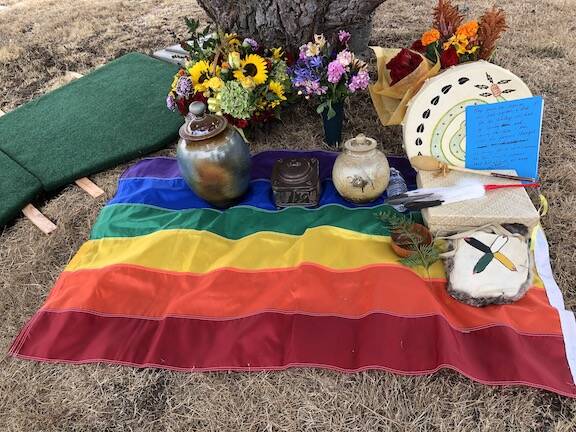When Jim Sherman and Michael Ferri moved to Coupeville in 2008, they brought four old friends with them. Jim, a member of the pioneer Sherman family that has lived on Ebey’s Prairie for more than a century, and Michael have been a devoted couple for about 40 years, having met when they lived in San Francisco in the 1980s and then moved to Seattle in 1990.
After they retired, they built a home overlooking Penn Cove and filled it with treasures that had accumulated through the years. They also invited four cherished friends to join them in their new home – Theodore Kirkland, Daniel Prezioso, Robert Bernier and Julio Suarez.
But, in fact, all had died years before Jim and Michael moved here. They were victims of the AIDS epidemic that swept the United States in the 1980s and 90s, largely affecting gay men like these four. Jim and Michael ended up with the cremated ashes of these friends, usually because no one else wanted them, including their families.
And, for more than a decade, their ashes remained in urns on a shelf in Jim and Michael’s house.
“I kept telling myself we needed to put them in the ground somewhere, but I wasn’t ready to let them go,” Michael said. “I liked having them near me.”
Theodore, Daniel, Robert and Julio were born in the 1940s and 50s and, ironically, died in their 40s and 50s, among the more than 700,000 Americans that have been lost so far to AIDS.
Today, our nation is afflicted with another epidemic, this one called COVID. But, for the most part, those suffering with that disease are not hated, judged and disowned for catching it. For much of the 1980s and well into the 90s, people with AIDS – especially gay men like Theodore, Daniel, Robert and Julio – were often harshly judged and their “dangerous” lifestyle was blamed for spreading the disease.
Theodore was a Black man from Ohio and a Navy veteran who was infected while he was in the service. When the Navy began testing – and discharging – anyone who tested positive for the AIDS virus, he left the Navy before his infection could be reported.
Daniel was a high-level tech person with an investment firm. When he got sick, he had to quit and go on disability in his mid-40s, then struggled with the disease until he died at 55. After he left his job, he became an outspoken advocate at his former employer and other firms for the compassionate treatment of those with AIDS.
Robert was a former romantic partner of Daniel’s who died in 1987 at age 45. Jim and Michael knew him only slightly, but when they went to San Francisco for Daniel’s memorial service and to claim his ashes (which Daniel had left in his will to Michael), they discovered Robert’s ashes in an urn on a shelf in Daniel’s condo.
“It’s obvious to me that Daniel wanted Robert to be buried with him,” Michael said. “And we wanted to make sure that would happen.”
Julio was a health care worker who worked with Michael in San Francisco. He was a Cuban-American who came as a young boy with his parents to Miami in the early 1960s to escape the new Castro regime in Cuba.
When they became sick with AIDS, Theodore, Robert and Daniel had some, if occasionally limited, involvement with their families. But when Julio became sick with AIDS, his family disowned him, never saw him before he died and refused to claim his remains.
Daniel, Theodore and Julio joined a gay men’s spiritual retreat in which Michael was involved. The retreat used theology from Native Americans, Buddhism and other faiths to help those suffering alienation and judgment from the broader society and often the Christian churches in which they had been raised.
“We formed our own families when our biological families sometimes rejected us,” Michael said. “And the retreat gave us spiritual grounding that we needed badly.”
Last spring, as the COVID epidemic continued to claim thousands of lives, Michael and Jim decided it was finally time to find a good place for their four friends to rest. For several years, they had owned a plot on a sloping hill at Sunnyside Cemetery in Coupeville. Their plan was that was where they would be buried together. But they also owned another plot nearby in an area where many of Jim’s Sherman family members are buried. Sunnyside is one of the oldest cemeteries in Washington, having been established in 1865.
“We decided that our friends would get the plot on the hill with a gorgeous view of Ebey’s Prairie and Admiralty Inlet,” Michael said.
And so, on a sunny afternoon earlier this month, the urns with ashes were lined up together under a cedar tree by the gravesite. Michael led a service including prayers and memories drawn from the gay men’s spiritual retreat. Then the urns were carefully placed in the grave and covered with soil. In a few weeks, the grave marker that Michael and Jim ordered will be installed.
And the four friends lost to a relentless disease were, at long last, given a beautiful place to rest. Now they reside in a community that none knew while they were alive but which, I am sure, would soon have called them friends too.
Harry Anderson is a retired journalist who worked for the Los Angeles Times and lives in Central Whidbey.



